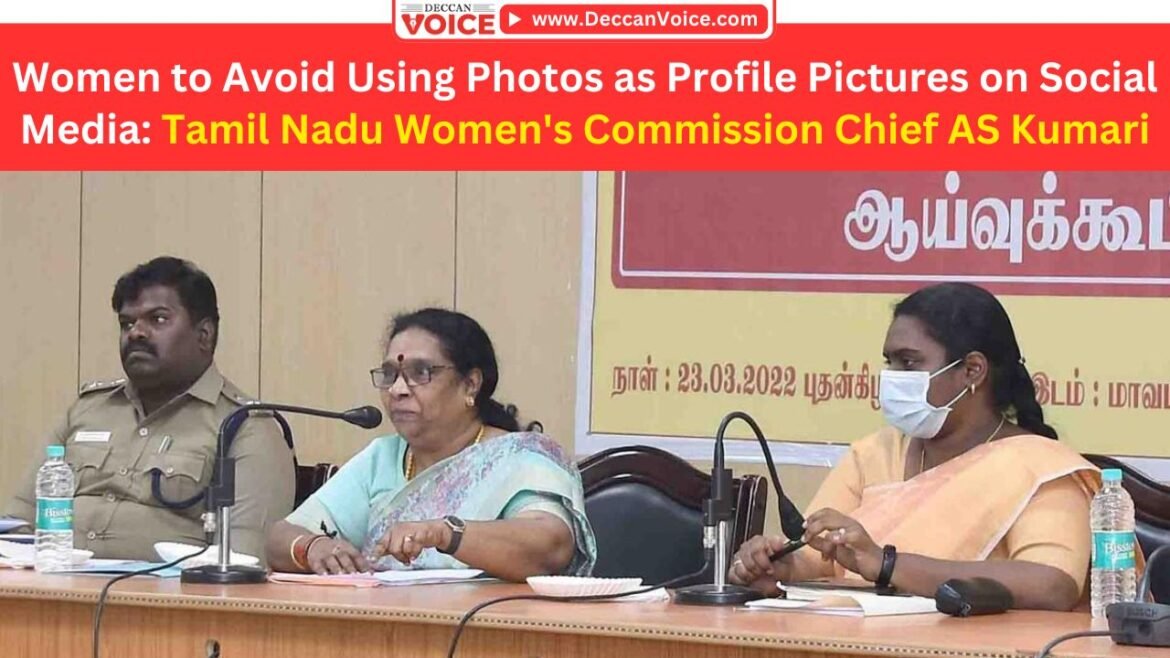Table of Contents
In a recent statement that has generated significant debate, Tamil Nadu Women’s Commission Chairperson AS Kumari advised women to avoid using their photos as profile pictures on social media platforms. This recommendation aims to protect women from potential online harassment and misuse of their images. However, it has also sparked discussions about the balance between safety precautions and the restriction of women’s freedom in the digital age.
The Advice
Concerns Over Online Safety
AS Kumari’s advice comes in the wake of growing concerns about online harassment, identity theft, and the misuse of personal images. By avoiding the use of personal photos as profile pictures, women can potentially reduce the risk of their images being misused for malicious purposes, such as cyberbullying or unauthorized alterations.
Specific Recommendations
The Chairperson suggested that women could opt for alternative images, such as avatars or symbolic pictures, instead of their actual photographs. This measure, she argues, can act as a deterrent to those who might otherwise exploit personal photos for inappropriate or harmful activities.
Public Reaction
Support for the Recommendation
Some segments of the public and various organizations have supported Kumari’s advice, viewing it as a pragmatic step towards safeguarding women’s online privacy and security. They argue that in an era where digital abuse is rampant, such measures are necessary to protect vulnerable users from potential threats.
Criticism and Concerns
However, the recommendation has also faced criticism. Detractors argue that advising women to refrain from using their own photos shifts the burden of preventing harassment onto the victims rather than addressing the behavior of perpetrators. They contend that such advice may inadvertently reinforce patriarchal norms by suggesting that women should restrict their activities to avoid harassment instead of promoting accountability for those who engage in such behavior.
Broader Implications
Balancing Safety and Freedom
The debate highlights a critical issue: the need to balance safety measures with the right of women to freely express themselves. While the intent behind Kumari’s advice is to protect women, it raises questions about whether such recommendations might limit women’s autonomy and reinforce the notion that they should change their behavior to avoid victimization.
Addressing the Root Causes
Critics argue that a more effective approach would involve stricter enforcement of laws against cybercrimes, educational initiatives to promote digital literacy and respectful online behavior, and greater accountability for those who perpetrate online harassment. By focusing on these root causes, society can create a safer online environment without imposing restrictions on how women present themselves source.
Expert Opinions
Cybersecurity Experts
Cybersecurity experts have weighed in, noting that while avoiding personal photos can be a useful precaution, it should be part of a broader strategy to enhance online safety. They emphasize the importance of using strong privacy settings, being cautious about sharing personal information, and reporting any instances of abuse to the relevant authorities.
Women’s Rights Advocates
Women’s rights advocates have called for a more nuanced approach. They argue that while personal safety is paramount, it is equally important to ensure that safety measures do not inadvertently curtail women’s rights to participate fully and freely in digital spaces. They advocate for comprehensive education on digital rights and safety for all users, irrespective of gender.
Conclusion
The advice from Tamil Nadu Women’s Commission Chairperson AS Kumari for women to avoid using their photos as profile pictures on social media has sparked a complex and multifaceted debate. While the recommendation is rooted in concerns about online safety, it also raises important questions about the balance between protective measures and the restriction of women’s freedoms. As the digital landscape continues to evolve, it is crucial to develop strategies that safeguard users while also promoting equality and autonomy. By addressing the root causes of online harassment and fostering a culture of accountability, society can work towards creating a safer and more inclusive online environment for all.



